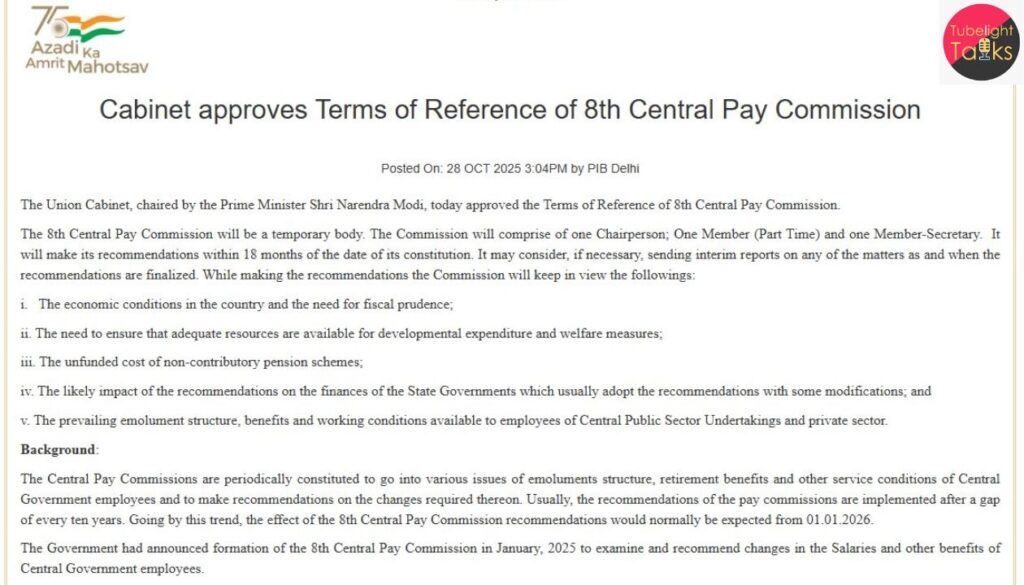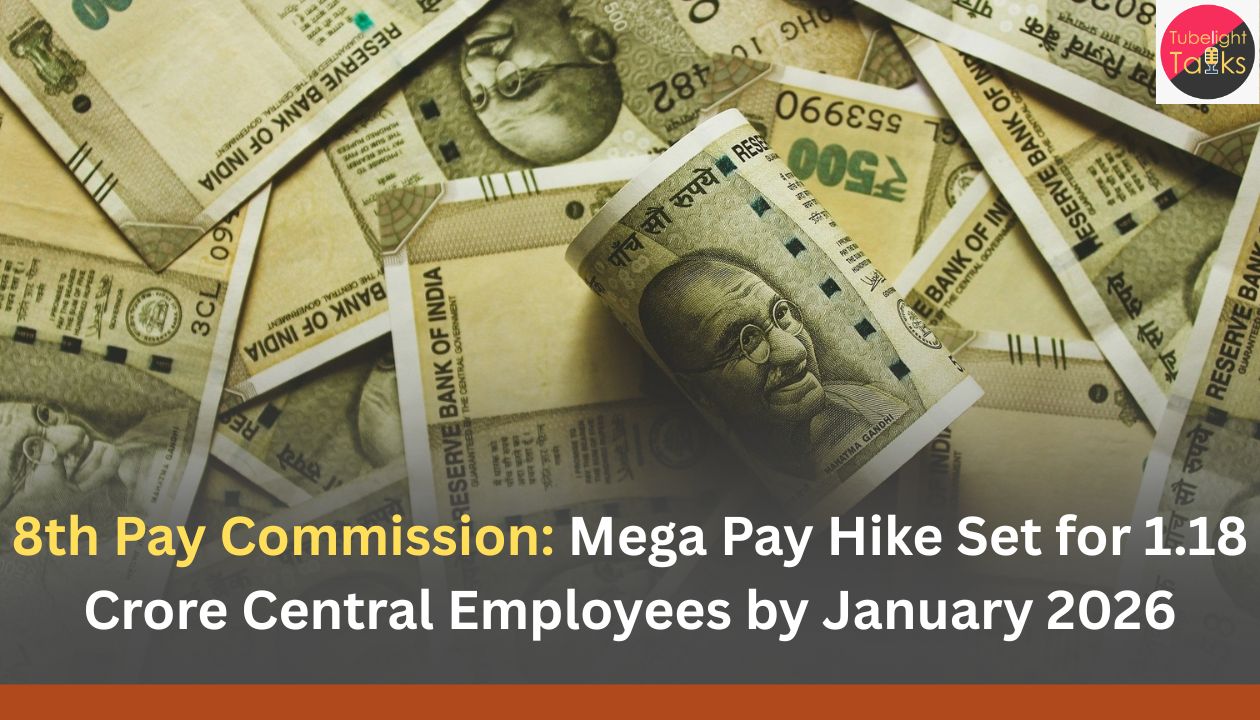8th Pay Commission Unlocked: Mega Pay Hike Set for 1.18 Crore Central Employees by January 2026
8th Pay Commission Unlocked: The long wait for a monumental change in the compensation structure for Central Government employees and pensioners is finally nearing its end. In a decisive move, the Union Cabinet, chaired by Prime Minister Narendra Modi, has formally approved the Terms of Reference (ToR) for the 8th Central Pay Commission (CPC).
This marks the initiation of the decadal revision that will directly impact the salaries, allowances, and pensions of over 1.18 crore people. The highly anticipated new pay scales are set to be implemented with retrospective effect from January 1, 2026. This move signals the government’s commitment to address the erosion of real value in emoluments due to inflation and to ensure a contemporary and fair pay structure.
Key Takeaways: What the 8th Pay Commission Approval Means for Central Employees
To ensure maximum search visibility and clear communication of the news, here are the most critical points from the Cabinet’s decision on the 8th Central Pay Commission:
- Formal Approval Date: The Union Cabinet approved the Terms of Reference (ToR) on Tuesday, October 28, 2025, ten months after giving an in-principle nod in January 2025.
- Implementation Deadline: The new pay structure is scheduled to be effective from January 1, 2026.
- Beneficiaries: The revision covers nearly 50 lakh central government employees (including defence services personnel) and the allowances of approximately 69 lakh pensioners.
- Commission Leadership: The temporary body will be chaired by former Supreme Court judge Ranjana Prakash Desai.
- Report Submission Timeline: The 8th CPC is mandated to submit its comprehensive recommendations to the government within 18 months of its official formation.
- Anticipated Salary Jump: Projections suggest a substantial increase, potentially adding up to ₹19,000 per month to paychecks, depending on the final budgetary allocation and fitment factor.
High-Profile Panel Takes the Helm: Composition and Mandate
The constitution of the 8th CPC is a critical milestone, officially kicking off the review process. The panel is structured to provide balanced recommendations, taking into account economic realities and employee welfare.

The Commission comprises a small yet powerful team:
- Chairperson: Former Supreme Court judge Ranjana Prakash Desai
- Part-Time Member: Professor Pulak Ghosh
- Member-Secretary: Pankaj Jain
This panel’s mandate is extensive and carefully defined. The ToR was finalized after consultations with major stakeholders, including the defence and home ministries, the Department of Personnel and Training (DoPT), state governments, and the staff side of the Joint Consultative Machinery.
Factors Guiding the Recommendations
While drafting its report, the 8th CPC is required to keep the following crucial factors in mind:
- Fiscal Prudence and Economy: Balancing the overall economic conditions in the country with the strict need for fiscal prudence.
- Developmental Needs: Ensuring that adequate resources remain available for developmental expenditure and welfare measures.
- State Finances: Assessing the likely impact of the recommendations on the finances of the State Governments, which typically adopt the central pay awards.
- Pension Schemes: Examining the unfunded cost of non-contributory pension schemes.
- Comparative Analysis: Reviewing the prevailing emolument structure, benefits, and working conditions available to employees of Central Public Sector Undertakings (CPSUs) and the private sector.
The Commission is fully empowered to send interim reports on specific matters as and when its recommendations are finalized, potentially accelerating the implementation of certain proposals.
The Anticipated Pay Jump: Fitment Factor and Budgetary Allocation
For central government employees, the most crucial question revolves around the magnitude of the salary hike. The last pay commission (7th CPC), constituted in February 2014, had its recommendations implemented from January 1, 2016.
The 8th CPC is expected to deliver a significant boost to compensation, primarily through the fitment factor, which is used to multiply the existing basic pay to arrive at the new basic pay.
- Fitment Factor Speculation: The 7th CPC recommended a fitment factor of around 2.57. Initial projections for the 8th CPC have ranged from a high of 2.86 (leading to the ₹19,000 per month projected increase) to a lower, earlier speculated factor of 1.8x or a range of 1.83 to 2.46. The government has, however, yet to officially disclose the specific pay parameters.
How the Hike Translates to Paychecks
The actual final increase will be directly linked to the Union Budgetary allocation for the pay revision. For a mid-level employee with a current basic salary of ₹1 lakh per month, the raise could vary substantially:
- A ₹1.75 lakh crore allocation could result in a 14% hike (salary increasing to ₹1.14 lakh).
- A ₹2 lakh crore allocation could mean a 16% hike (salary increasing to ₹1.16 lakh).
- An allocation reaching ₹2.25 lakh crore is projected to facilitate an 18% or more hike (salary increasing to ₹1.18 lakh or higher).
Allowances, including Dearness Allowance (DA)—which is disbursed every six months to compensate for the erosion of real value due to inflation—House Rent Allowance (HRA), and Travel Allowance (TA), will also undergo significant recalculation and enhancement, further boosting the take-home pay.
Also Read: 8th Pay Commission: Major Salary Hike for Central Govt Employees
Setting the Financial Course for the Next Decade
The formal approval of the Terms of Reference for the 8th Pay Commission is far more than just a bureaucratic step; it is the official promise of a complete salary overhaul for millions of individuals who form the backbone of the nation’s administration.
Following the ten-year cycle, the commission’s recommendations, led by Justice Ranjana Prakash Desai, will determine the economic course for central government employees and pensioners for the next decade. While the exact fitment factor and final figures remain under wraps, the clock has officially started on the 18-month deadline.
This development is expected to significantly boost employee morale and purchasing power, even as the government maintains a strict eye on fiscal prudence and the financial health of state governments. All eyes are now on the appointed panel to deliver a comprehensive and equitable pay structure from January 1, 2026.
FAQs on the 8th Central Pay Commission
1. When is the 8th Pay Commission expected to be implemented?
The 8th Pay Commission’s recommendations are anticipated to be implemented retrospectively from January 1, 2026, following the decadal revision cycle.
2. Who has been appointed as the Chairperson of the 8th Pay Commission?
Former Supreme Court judge Ranjana Prakash Desai has been appointed to head the Commission as the Chairperson.
3. How many central government employees and pensioners will benefit from the 8th CPC?
Over 1.18 crore beneficiaries will be impacted, specifically nearly 50 lakh central government employees and approximately 69 lakh pensioners.
4. What is the deadline for the 8th Pay Commission to submit its recommendations?
The Commission is mandated to submit its comprehensive recommendations to the government within 18 months of its official formation.
5. What is the expected fitment factor for the salary hike in the 8th Pay Commission?
While the official factor is not disclosed, speculations range from a high of 2.86 to a lower range of 1.8x to 2.46, resulting in a substantial pay jump.











Discussion (0)